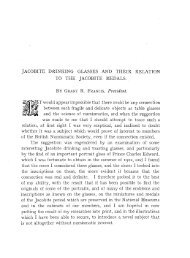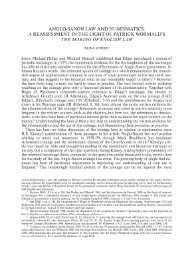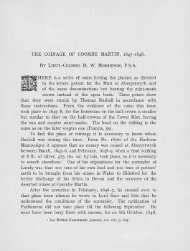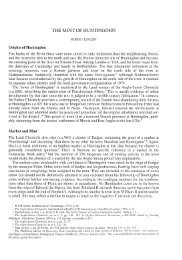a re-examination of a gold medal awarded to major rogers for ...
a re-examination of a gold medal awarded to major rogers for ...
a re-examination of a gold medal awarded to major rogers for ...
Create successful ePaper yourself
Turn your PDF publications into a flip-book with our unique Google optimized e-Paper software.
MAJOR ROGERS FOR VALOROUS SERVICES IN 1690 147<br />
ab<strong>re</strong>ast, the Inniskilling Foot hard on the heels <strong>of</strong> the leading troops; a little <strong>to</strong> the left<br />
a column <strong>of</strong> Huguenot <strong>re</strong>giments ente<strong>re</strong>d the st<strong>re</strong>am, and farther still <strong>to</strong> the left we<strong>re</strong> the<br />
English infantry wading up <strong>to</strong> their armpits in water. In a few minutes the Boyne <strong>for</strong> a<br />
quarter <strong>of</strong> a mile was alive with muskets and g<strong>re</strong>en boughs, <strong>for</strong> so alike we<strong>re</strong> the troops<br />
on both sides d<strong>re</strong>ssed, that the Williamites had placed boughs in their hats <strong>to</strong> distinguish<br />
them from the Jacobites, who wo<strong>re</strong> pieces <strong>of</strong> paper <strong>to</strong> <strong>re</strong>p<strong>re</strong>sent the white cockade. It was<br />
not until the attackers we<strong>re</strong> in the middle <strong>of</strong> the st<strong>re</strong>am that they became awa<strong>re</strong> <strong>of</strong> the<br />
danger <strong>of</strong> the enterprise on which they we<strong>re</strong> embarked. Up till then little mo<strong>re</strong> than half<br />
<strong>of</strong> the hostile army had been seen, now whole <strong>re</strong>giments <strong>of</strong> horse and foot seemed <strong>to</strong><br />
start out <strong>of</strong> the ground, and a wild shout <strong>of</strong> defiance rose from the Meath sho<strong>re</strong>. Just <strong>for</strong><br />
one moment the issue <strong>of</strong> the battle hung in the balance, but, infused with the spirit <strong>of</strong><br />
their indefatigable leaders, the British and their continental supporters pushed on, and<br />
soon the Jacobites, though in some instances fighting with g<strong>re</strong>at courage, gave way. The<strong>re</strong><br />
is, it may be noticed, no <strong>re</strong>fe<strong>re</strong>nce <strong>to</strong> any individual acts <strong>of</strong> courage or leadership such<br />
as would have merited the award <strong>of</strong> a special <strong>gold</strong> <strong>medal</strong>, nor indeed any g<strong>re</strong>at opportunity<br />
<strong>for</strong> the display <strong>of</strong> individual as opposed <strong>to</strong> corporate valour.<br />
When the Inniskilling Foot we<strong>re</strong> <strong>re</strong>viewed a week later they muste<strong>re</strong>d 625 men, their<br />
average st<strong>re</strong>ngth, so their losses at the Battle <strong>of</strong> the Boyne must have been negligible and<br />
their part in the actual fighting small.<br />
Another Irish infantry unit in William's <strong>for</strong>ces at this battle was Meath's Foot, later<br />
the 18th Royal Irish Regiment, and in their <strong>re</strong>gimental his<strong>to</strong>ry by Lieutenant-Colonel<br />
G<strong>re</strong>t<strong>to</strong>n the only <strong>re</strong>fe<strong>re</strong>nce <strong>to</strong> the Battle <strong>of</strong> the Boyne is:' As the XVIIIth <strong>re</strong>giment played<br />
no important part in the engagement, if, indeed, it came under fi<strong>re</strong> at all, it is only<br />
necessary <strong>to</strong> say that though some <strong>of</strong> James's troops fought with distinguished gallantry<br />
in this battle, others did not show the fine qualities they exhibited later at Limerick and<br />
Aughrim.'<br />
We a<strong>re</strong> left wondering why the Irish Infantry <strong>re</strong>giments with William <strong>to</strong>ok such a small<br />
part in the battle and the<strong>re</strong> seem <strong>to</strong> be two explanations (a) that William did not trust<br />
them, or (b) that they had suffe<strong>re</strong>d seve<strong>re</strong>ly from their having spent the winter billeted<br />
in the countryside <strong>of</strong> Ulster. The first explanation may be true <strong>of</strong> the XVIIIth Foot as<br />
their Colonel, Lord Forbes, had <strong>re</strong>signed his commission rather than fight against James,<br />
<strong>to</strong> whom he had sworn allegiance. Such an explanation could not, however, apply <strong>to</strong><br />
the men from Enniskillen. Should William be unsuccessful at the Boyne they could look<br />
<strong>for</strong> nothing better than a charge <strong>of</strong> t<strong>re</strong>ason <strong>for</strong> their part in defying James in 1688 and<br />
1689. Such men would su<strong>re</strong>ly fight with the courage given by despair if they had not<br />
been animated by their successes in the past. The second explanation that they had<br />
suffe<strong>re</strong>d so seve<strong>re</strong>ly from their privations in the winter as <strong>to</strong> be unfit <strong>for</strong> service falls<br />
through as Schomberg's <strong>re</strong>port on the troops under his command on 23 Oc<strong>to</strong>ber 1689<br />
states, ' Meath's is the best <strong>re</strong>giment <strong>of</strong> all the army, both as <strong>re</strong>gards clothing and good<br />
order, and the <strong>of</strong>ficers generally good. The soldiers being all <strong>of</strong> this province, the campaign<br />
is not so hard on them as on others.' The men <strong>of</strong> Enniskillen we<strong>re</strong> also accus<strong>to</strong>med<br />
<strong>to</strong> the climate and so suffe<strong>re</strong>d little from the winter and their st<strong>re</strong>ngth a week after the<br />
Battle <strong>of</strong> the Boyne being so high also points <strong>to</strong> the<strong>re</strong> being little sickness among them.<br />
Since neither explanation is satisfac<strong>to</strong>ry it can only be supposed that the small loss<br />
suffe<strong>re</strong>d by the Irish infantry units in William's army was due <strong>to</strong> a <strong>for</strong>tunate chance<br />
which placed them in what <strong>to</strong>day would be called 'a quiet section <strong>of</strong> the line'.


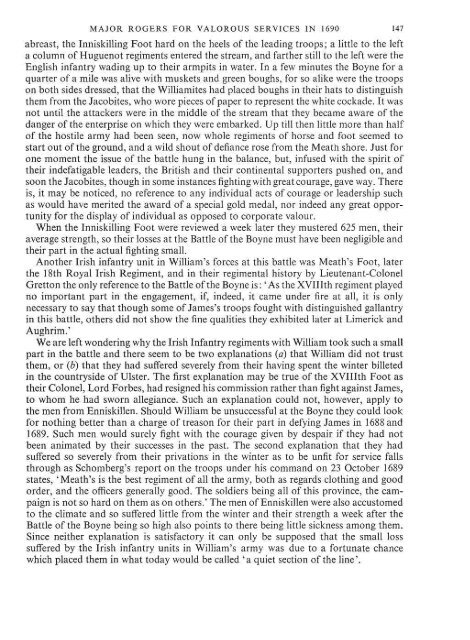
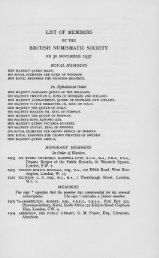
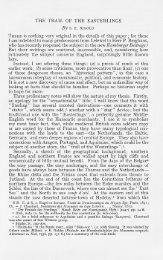
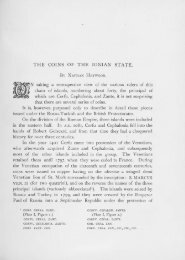
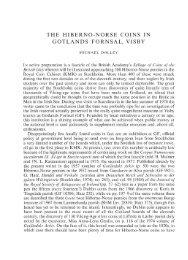
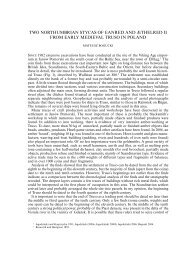

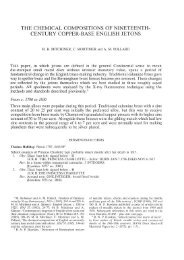
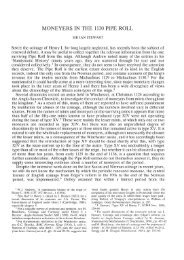
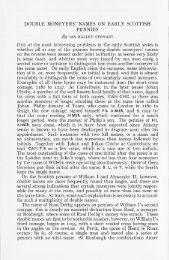
![Two Anglo-Saxon notes: [1] A Cnut die-link between the mints of ...](https://img.yumpu.com/15433998/1/189x260/two-anglo-saxon-notes-1-a-cnut-die-link-between-the-mints-of-.jpg?quality=85)
